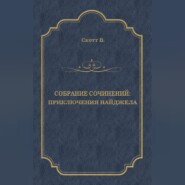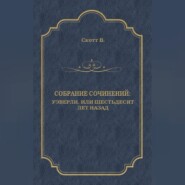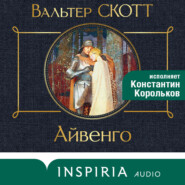По всем вопросам обращайтесь на: info@litportal.ru
(©) 2003-2024.
✖
St. Ronan's Well
Настройки чтения
Размер шрифта
Высота строк
Поля
This Gallic word (hôtel) was first introduced in Scotland during the author's childhood, and was so pronounced by the lower class.
9
The foundress of a sect called Buchanites; a species of Joanna Southcote, who long after death was expected to return and head her disciples on the road to Jerusalem.
10
p. 33. “He was nae Roman, but only a Cuddie, or Culdee.” Some Scottish Protestants took pride in believing that their Kirk descended from Culdees, who were not of the Roman Communion. The Culdees have given rise to a world of dispute, and he would be a bold man who pretended to understand their exact position. The name seems to be Cele De, “servant [gillie] of God.” They were not Columban monks, but fill a gap between the expulsion of the Columbans by the Picts, and the Anglicising and Romanising of the Scottish Church by St. Margaret and her sons. Originally solitary ascetics, they clustered into groups, and, if we are to believe their supplanters at St. Andrews, the Canons Regular, they were married men, and used church property for family profit. Their mass they celebrated with a rite of their own, in their little church. They were gradually merged in, and overpowered at St. Andrews, for example, by the Canons Regular, and are last heard of in prosecuting a claim to elect the Bishop, at the time of Edward the First's interference with Scottish affairs. The points on which they differed from Roman practice would probably have seemed very insignificant to such a theologian as Meg Dods.
11
Escrouelles, King's Evil.
12
The usual expression for a slight encroachment on a neighbour's property.
13
The said piper was famous at the mystery.
14
Skates are called sketchers in Scotland.
15
p. 47. “Fortunio, in the fairy-tale.” The gifted companions of Fortunio, Keen-eye, Keen-ear, and so forth, are very old stock characters in Märchen: their first known appearance is in the saga of Jason and the Fleece of Gold.
16
The one or the other was equally in votis to Ascanius, —
“Optat aprum, aut fulvum descendere monte leonem.”
Modern Trojans make a great distinction betwixt these two objects of chase.
17
Note II. (#pgepubid00050)– The Dark Ladye.
18
The late Dr. Gregory is probably intimated, as one of the celebrated Dr. Cullen's personal habits is previously mentioned. Dr. Gregory was distinguished for putting his patients on a severe regimen.
19
A fur pouch for keeping tobacco.
20
p. 169. “The sportsman's sense of his own cruelty.” In the reminiscences of Captain Basil Hall, published by Lockhart, he mentions that Scott himself had a dislike of shooting, from a sentiment as to the cruelty of the sport. “I was never quite at ease when I had knocked down my blackcock, and going to pick him up he cast back his dying eye with a look of reproach. I don't affect to be more squeamish than my neighbours, but I am not ashamed to say that no practice ever reconciled me fully to the cruelty of the affair. At all events, now that I can do as I like without fear of ridicule, I take more pleasure in seeing the birds fly past me unharmed.” (Lockhart, vii. 331.)
21
Bogle – in English, Goblin.
22
A kettle of fish is a fête-champêtre of a particular kind, which is to other fêtes-champêtres what the piscatory eclogues of Brown or Sannazario are to pastoral poetry. A large caldron is boiled by the side of a salmon river, containing a quantity of water, thickened with salt to the consistence of brine. In this the fish is plunged when taken, and eaten by the company fronde super viridi. This is accounted the best way of eating salmon, by those who desire to taste the fish in a state of extreme freshness. Others prefer it after being kept a day or two, when the curd melts into oil, and the fish becomes richer and more luscious. The more judicious gastronomes eat no other sauce than a spoonful of the water in which the salmon is boiled, together with a little pepper and vinegar.
23
For example, a man cannot be tried for murder merely in the case of the non-appearance of an individual; there must be proof that the party has been murdered.
24
This was a peculiarity in the countenance of the celebrated Cossack leader, Platoff.
25
An epithet which expresses, in Scotland, what the barometer calls rainy.
26
p. 240. “Tintock.” A hill on the Upper Tweed, celebrated in local rhyme as —
On Tintock tap there is a mist,
And in the mist there is a kist,
And in the kist there is a cap,
And in the cap there is a drap.
Tak' up the cap, drink out the drap,
And set it down on Tintock tap.
Andrew Lang
December 1893.
27
p. 245. “Donald Cargill.” See Editor's Notes to “Redgauntlet.” Howie of Lochgoin says Cargill was executed in Edinburgh, not at Queensferry, as stated here.
28
Note III. (#pgepubid00051)– Mago-Pico.
29
Scotticé, for “admitted the rain.”
9
The foundress of a sect called Buchanites; a species of Joanna Southcote, who long after death was expected to return and head her disciples on the road to Jerusalem.
10
p. 33. “He was nae Roman, but only a Cuddie, or Culdee.” Some Scottish Protestants took pride in believing that their Kirk descended from Culdees, who were not of the Roman Communion. The Culdees have given rise to a world of dispute, and he would be a bold man who pretended to understand their exact position. The name seems to be Cele De, “servant [gillie] of God.” They were not Columban monks, but fill a gap between the expulsion of the Columbans by the Picts, and the Anglicising and Romanising of the Scottish Church by St. Margaret and her sons. Originally solitary ascetics, they clustered into groups, and, if we are to believe their supplanters at St. Andrews, the Canons Regular, they were married men, and used church property for family profit. Their mass they celebrated with a rite of their own, in their little church. They were gradually merged in, and overpowered at St. Andrews, for example, by the Canons Regular, and are last heard of in prosecuting a claim to elect the Bishop, at the time of Edward the First's interference with Scottish affairs. The points on which they differed from Roman practice would probably have seemed very insignificant to such a theologian as Meg Dods.
11
Escrouelles, King's Evil.
12
The usual expression for a slight encroachment on a neighbour's property.
13
The said piper was famous at the mystery.
14
Skates are called sketchers in Scotland.
15
p. 47. “Fortunio, in the fairy-tale.” The gifted companions of Fortunio, Keen-eye, Keen-ear, and so forth, are very old stock characters in Märchen: their first known appearance is in the saga of Jason and the Fleece of Gold.
16
The one or the other was equally in votis to Ascanius, —
“Optat aprum, aut fulvum descendere monte leonem.”
Modern Trojans make a great distinction betwixt these two objects of chase.
17
Note II. (#pgepubid00050)– The Dark Ladye.
18
The late Dr. Gregory is probably intimated, as one of the celebrated Dr. Cullen's personal habits is previously mentioned. Dr. Gregory was distinguished for putting his patients on a severe regimen.
19
A fur pouch for keeping tobacco.
20
p. 169. “The sportsman's sense of his own cruelty.” In the reminiscences of Captain Basil Hall, published by Lockhart, he mentions that Scott himself had a dislike of shooting, from a sentiment as to the cruelty of the sport. “I was never quite at ease when I had knocked down my blackcock, and going to pick him up he cast back his dying eye with a look of reproach. I don't affect to be more squeamish than my neighbours, but I am not ashamed to say that no practice ever reconciled me fully to the cruelty of the affair. At all events, now that I can do as I like without fear of ridicule, I take more pleasure in seeing the birds fly past me unharmed.” (Lockhart, vii. 331.)
21
Bogle – in English, Goblin.
22
A kettle of fish is a fête-champêtre of a particular kind, which is to other fêtes-champêtres what the piscatory eclogues of Brown or Sannazario are to pastoral poetry. A large caldron is boiled by the side of a salmon river, containing a quantity of water, thickened with salt to the consistence of brine. In this the fish is plunged when taken, and eaten by the company fronde super viridi. This is accounted the best way of eating salmon, by those who desire to taste the fish in a state of extreme freshness. Others prefer it after being kept a day or two, when the curd melts into oil, and the fish becomes richer and more luscious. The more judicious gastronomes eat no other sauce than a spoonful of the water in which the salmon is boiled, together with a little pepper and vinegar.
23
For example, a man cannot be tried for murder merely in the case of the non-appearance of an individual; there must be proof that the party has been murdered.
24
This was a peculiarity in the countenance of the celebrated Cossack leader, Platoff.
25
An epithet which expresses, in Scotland, what the barometer calls rainy.
26
p. 240. “Tintock.” A hill on the Upper Tweed, celebrated in local rhyme as —
On Tintock tap there is a mist,
And in the mist there is a kist,
And in the kist there is a cap,
And in the cap there is a drap.
Tak' up the cap, drink out the drap,
And set it down on Tintock tap.
Andrew Lang
December 1893.
27
p. 245. “Donald Cargill.” See Editor's Notes to “Redgauntlet.” Howie of Lochgoin says Cargill was executed in Edinburgh, not at Queensferry, as stated here.
28
Note III. (#pgepubid00051)– Mago-Pico.
29
Scotticé, for “admitted the rain.”

















